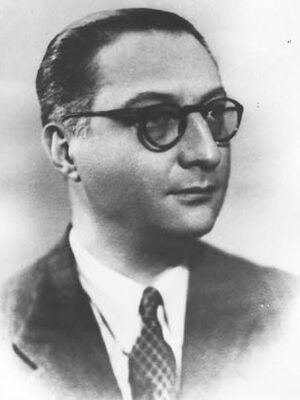Selim Sarper
(diplomat, politician) | ||||||||||||
|---|---|---|---|---|---|---|---|---|---|---|---|---|
 | ||||||||||||
| Born | June 14, 1899 Constantinople, Ottoman Empire | |||||||||||
| Died | 11 October 1968 (Age 69) Ankara, Turkey | |||||||||||
| Nationality | Turkish | |||||||||||
| Alma mater | Humboldt University of Berlin, Ankara University | |||||||||||
| Children | • daughters: Ülker • Vanlı | |||||||||||
| Spouse | Kamuran Sarper | |||||||||||
| Party | Republican People's Party, (CHP) | |||||||||||
Attended the 1959 Bilderberg in Turkey. Became Turkish Minister of Foreign Affairs on the day after the 1960 Turkish coup d'état
| ||||||||||||
Selim Rauf Sarper was a Turkish diplomat and politician. He was Minister of Foreign Affairs between 1960–1962 after the 1960 Turkish coup d'état. He attended the 1959 Bilderberg meeting.
Contents
Early years
Selim Sarper was born on 14 June 1899 in Constantinople. He spent his youth years in Germany, where he finished the high school in 1918, and attended University of Berlin to study Law. At the age of 24, The Turkish Republic was proclaimed in his home country.[1][2]
Returned home, he studied at Ankara University Law School. He then served as a teacher of French language in a high school at Adana in 1923 before he worked as a clerk at the Independence Tribunal in the early years of the Republican era. In 1927, he entered the Ministry of Foreign Affairs as a translator.[1][2]
Diplomatic career
In 1928, he was appointed as vice-consul in Odessa, Soviet Union, in 1929 third secretary at the Turkish Embassy in Moscow and two years later he was promoted to the post of second secretary at the same office. His further assignments were, Consul in Komotini, Greece in 1933, Consul in Odessa in 1935, Consul in Berlin, Germany in 1937 and Ambassador in Bucharest, Romania in 1939.[2]
In the 1940s, Sarper served as the Director of the governmental Press and Information Agency. During the World War II years, he was responsible for the administration of the official propaganda and information.[1][2]
In 1944, Selim Sarper was appointed Turkey's Ambassador to Moscow, an important mission during the last years of World War II and the early years of the Cold War (1947-1991).[2] A conversation he had with the Soviet Minister of Foreign Affairs Molotov on 7 June 1945 was used to concot the Turkish Straits Crisis. According to President İsmet İnönü, the conversation indicated that Turkey might have been under a territorial claim threat from the Soviet Union. Turkey subsequently aligned itself with the United States, and joined NATO in 1951. After the related official documents in the U.S. archives were made available to the public, it became clear that Sarper reported the subject of his conversation to the U.S. Ambassador W. Averell Harriman, even before he notified his government. However, his report to Harriman does not mention any threat by the Soviet Union, and the memoirs of Molotov deny such an allegation.[1]
In 1946, Sarper became Ambassador to Italy in Rome, in 1947 United Nations Permanent Representative and in 1957 Permanent Representative of Turkey to NATO.[1]
1960 Turkish coup d'état
On May 28, the next day of the 1960 Turkish coup d'état (possibly organized by NATO's Gladio network), Selim Sarper, took United States Ambassador in Ankara Fletcher Warren to the coup leader General Cemal Gürsel for a visit. Sarper was appointed the same day Minister of Foreign Affairs replacing Fahri Korutürk in the draft cabinet list.[1]
Sarper entered later the Republican People's Party (CHP) running for a seat in the parliament at the 1961 general elections. He continued to serve at his post as Minister of Foreign Affairs until February 16, 1962.[1]
Revealed U.S. diplomatic documents show that during his term in the İnönü's coalition cabinet, Sarper made assessments to the U.S. Government and told high words about his own head of state like "That Gürsel was not a great brain".[1]
In the 1965 general elections, Sarper was re-elected into the parliament as a deputy from Istanbul Province.
Event Participated in
| Event | Start | End | Location(s) | Description |
|---|---|---|---|---|
| Bilderberg/1959 | 18 September 1959 | 20 September 1959 | Turkey Yesilkoy | The 8th Bilderberg and the first in Turkey. 60 guests. |